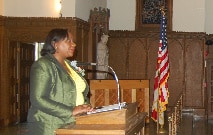Mass migration of Caribbean professionals cause for concern
GREATER GEORGETOWN, Guyana – Dr Edward Greene, Assistant Secretary-General for Human and Social Development, of the CARICOM Secretariat is advocating for the Caribbean Community to appropriate policies necessary to plug the mass migration of Caribbean professionals – especially nurses, teachers and doctors – to developed countries.
Speaking at the International Conference to mark the Third Year of the Caribbean Accreditation Authority for Education in Medicine and other Health Professions, in Jamaica, on May 13, 2007, Dr Greene reiterated the need for accreditation issues to be discussed within the context of other global challenges affecting Caribbean professionals, noting that several cross-cutting issues, including out migration of professionals and the liberalization of tertiary education were impacting the development of accreditation mechanisms.
“Accreditation issues cannot be discussed in a vacuum. In the Community, as is the case for most of the developing world, several pertinent issues must be addressed simultaneously with streamlining and perfecting the accreditation mechanism.” The Assistant Secretary General said.
Referring to research findings by CARICOM in 2006, Dr Greene explained that over the past 10 years approximately 50,000 nurses migrated at an estimated loss of US$2. 2M from the investment in training at the public’s expense, and charged the conference to critically treat with the challenge of “how to contain the out migration of our medical doctors and particularly our nurses.”
The Caribbean Commission on Health and Development, chaired by Sir George Alleyne had associated the shortage of nurses in the CARICOM Region to the shortage of trained personnel.
This, Dr Greene added is also directly linked to the current rate of vacant nursing positions estimated at 12 percent of the total workforce, and the decline in graduating nurses by 23 percent.
“Indeed, the shortfall in nurses predicted by the US Department of Health and Human Services (2002) will be 800,000 by 2020,” he remarked.
Similar studies for medical doctors, medical technicians, teachers and other trained personnel reveal startling statistics, especially for countries such as Jamaica and Guyana where an International Monetary Fund (IMF) study (2005) estimated that over 40 and 75 percent respectively of trained personnel in these countries migrated during 2000-2004.
Dr. Greene informed the Conference that the Council for Human and Social Development (COHSOD) had called for an overall policy of managed migration and further noted that the matter would be discussed at the historic Conference on the Caribbean, scheduled for 19-21 June in Washington DC.
Citing the liberalization of Tertiary Education as another challenge to accreditation issues, the Assistant Secretary General said that the issue has major implications for Caribbean universities, particularly for the Faculties of Medicine and other health specializations.
Based on studies conducted by the UWI, liberalization of higher education could result in the diversion of public funding from UWI and other national universities.
Dr Greene noted that although there is a proliferation of offshore universities in the Caribbean, “only a few CARICOM States have established appropriate legislation and administrative arrangements for regulation and quality assurance of those universities.”
“There is need to strike a balance between the advantages to be gained from increased direct foreign investment in the higher education sector and the need to protect the viability of the Region’s tertiary level institutions and the learning integrity of Caribbean citizens,” the Assistant Secretary General opined.
Dr Greene told the Conference that there was an agreement within CARICOM to adopt a regional position on those issues, which might require re-negotiation to safeguard the special interests of the Community.
The conference, chaired by Professor, E. R. ‘Micky’ Walrond of Barbados was approved by the Conference of Heads of Government of the Caribbean Community (CHOG) in St Lucia in March 2004 and ratified in July 2004.
Co-sponsored by the World Federation for Medical Education, the conference brought together leading experts on accreditation for medical and health professions from Canada, United States, United Kingdom, Latin America and the Caribbean.

